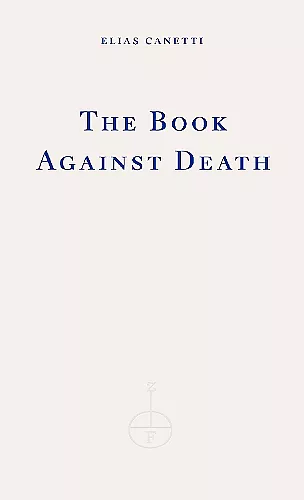The Book Against Death
Elias Canetti author Joshua Cohen author Peter Filkins translator
Format:Paperback
Publisher:Fitzcarraldo Editions
Published:6th Jun '24
Should be back in stock very soon

In 1937, Elias Canetti began collecting notes for the project that ‘by definition, he could never live to complete’, as translator Peter Filkins writes in his afterword. The Book Against Death is the work of a lifetime: a collection of Canetti’s aphorisms, diatribes, musings and commentaries on and against death – published in English for the first time since his death in 1994 – interspersed with material from philosophers and writers including Goethe, Walter Benjamin and Robert Walser. This major work by the 1981 Nobel Prize in Literature laureate is a disarming and often darkly comic reckoning with the inevitability of death and with its politicization, evoking despair at the loss of loved ones and the impossibility of facing one’s own death, while fiercely protesting the mass deaths incurred during war and the willingness of the despot to wield death as power. Infused with fervour and vitality, The Book Against Death ultimately forms a moving affirmation of the value of life itself.
‘Bereavements provide the personal background to Canetti’s preoccupation with death, but there was also a political dimension. Though he spent the First World War in neutral Switzerland, the carnage and its aftermath darkened the horizon for his generation…. This book is therefore, among other things, a threnody for a generation of European Jews, the last for whom German was the natural language of literature…. [Canetti’s] conflicted relationship with Germany forms a fascinating subplot to the book.’
— Daniel Johnson, Times Literary Supplement
‘Canetti would not shrug-off or laugh death out of his mind: he is sincere, clamorous, indignant and endlessly aggrieved. His disdain is boundless and therefore so is his book, for which no material is beyond incorporation. As with all acquisitive projects, it is never satiated – it acknowledges no terminus. It finished only when Canetti himself was finished by death…. He is always in defiance against seemingly eternal forces: power, society, religion, God, death. And it is not enough simply to think about something––all thoughts are enlisted in the conquest of their subject. Canetti’s pensée amounts to an act of protest, a great refutation, culminating in the ultimate refutation of death.‘
– Jared Marcel Pollen, New Statesman
‘[A] captivating collection of Canetti’s notes…. If death involves fixity, then life demands movement. The Book Against Death refuses finality by remaining forever on the cusp of transformation. It will await its final revision until the end of time. It can’t save all of us, as Canetti longed to, but there is a small portion of immortality to be found in it nonetheless.’
— Becca Rothfeld, Washington Post
‘Rarely has anyone been so at home in the mind, with so little ambivalence. Far from being a source of complacency, this attitude is Canetti’s great strength.... [He] is someone who has felt in a profound way the responsibility of words.... His work eloquently and nobly defends tension, exertion, moral and amoral seriousness.’
— Susan Sontag, New York Review of Books
‘Canetti invites – indeed, compels – judgement. His exacting presence honours literature.’
— George Steiner, New Yorker
‘Canetti led his life without compromise, fear, or guilt, and [reading him is] like discovering, without warning, a complex and satisfying work of art.’
— David Denby, New Yorker
‘One of our great imaginers and solitary men of genius.’
— Iris Murdoch
‘The erudition is genuinely awe-inspiring.’
— Salman Rushdie
‘Before there was the mysterious W. G. Sebald, there was the even more mysterious Elias Canetti’
— Clive James, New York Times
‘By virtue of his abundant wit and stylistic pithiness, Canetti stands out as one of the foremost aphorists of our time, a man who, in his phrasing of life’s ironies, is sometimes reminiscent of great predecessors like La Bruyère and Lichtenberg.’
— Swedish Academy, Nobel Prize in Literature 1981
‘This heterogeneous collage of vignettes, literary theory and personal musings against the notion of dying, from the Nobel Prize-winning author of Auto-da-Fé (1947), is stitched together by a humorous, analytically sharp tone, with a healthy dose of anger and despair.’
— Ivana Cholakova, Frieze
‘It displays all of Canetti’s erudition—observations about animal life intermingle with tales from classical China, philosophers and writers are put under the knife, and every religion will be cited and lambasted in equal measure—as well as his bleak wit. It also displays, par excellence, his contrarian nature…. He juxtaposes writing and death; the marks on the page are the opposite of the marks on the tombstone.’
— Duncan Stuart, The Millions
‘The Book Against Death represents something of a guerilla campaign: the death of death via a thousand cuts, with the weapon of a thousand aphorisms and ephemera. To read it is to experience a sustained, gradual expansion of one’s conception of what death is, and the role it plays in human life…. With this most recent translation by Peter Falkins, Canetti secures how he will be remembered – indeed, how he will manage to defy death: contorted with pain but not corrupted, single-minded and immortal in his defiance.’
— Sebastián Sánchez, Asymptote
‘The power of Canetti’s method, in its flexibility and its range, achieves that rarest of contemporary feelings: a clear and terrible vision of human inadequacy which itself does not harden into contempt and spite.... the most important literary expression, in the last forty years, of the processes of delusion.’
— Raymond Williams (praise for Auto da Fé)
‘One of the few undoubted masterpieces of our time.’
— John Davenport (praise for Auto da Fé)
ISBN: 9781804270899
Dimensions: unknown
Weight: unknown
352 pages